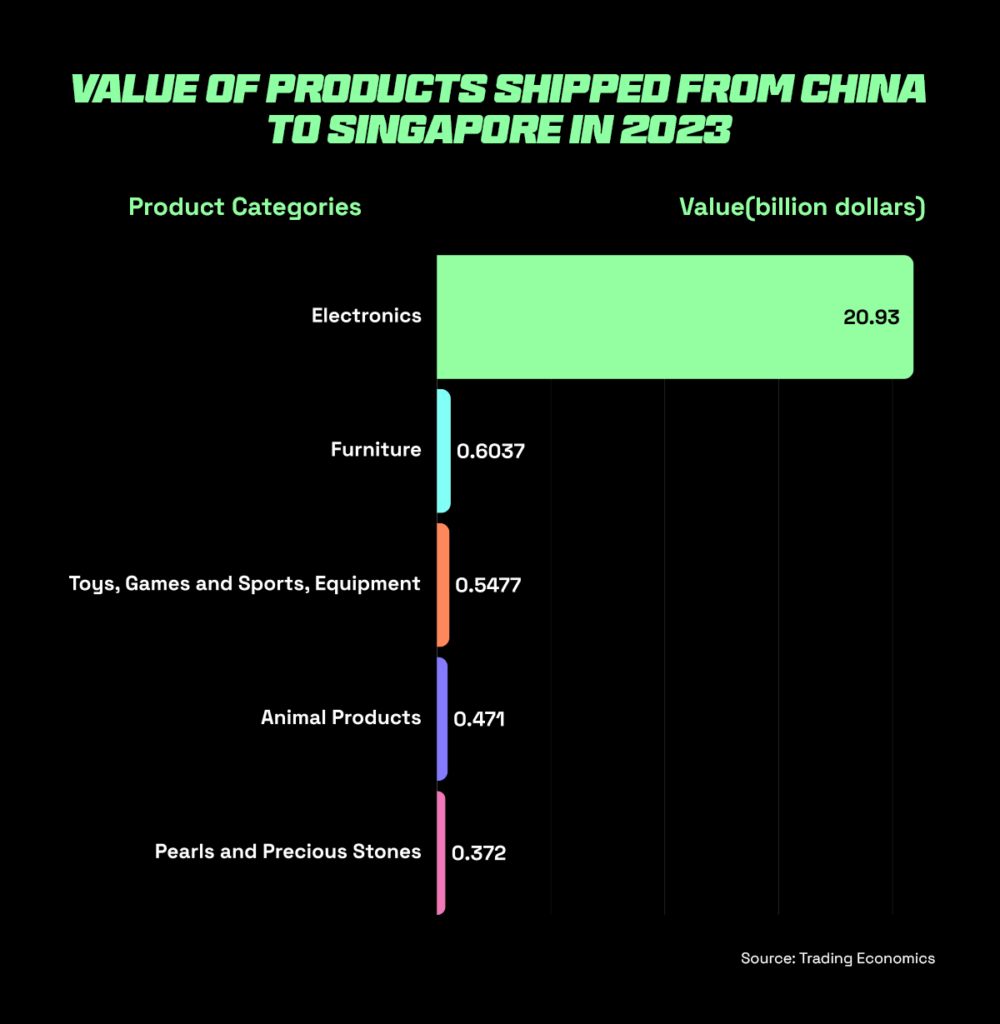
Shipping from China to Singapore is a cornerstone of the region’s trade and economic growth. It ensures business continuity and strengthens supply chain resilience for sellers sourcing from China and international sellers in Singapore. In 2023 alone, the total value of imports from China reached US $58.79 billion. Electronics topped the imports list, followed by machinery and furniture.
As Singapore’s largest import partner, China accounts for 13.2% of the country’s total imports. The shipping routes between these two trade giants are critical for sustaining the flow of goods. Globally, Singapore ranks 16th in terms of imports, highlighting its pivotal role in international trade.
Knowing how to ship from China to Singapore is crucial for e-commerce businesses looking to import. This guide will walk you through the essential steps and help you navigate the complexities of customs. Let’s get started!
When should e-commerce sellers consider shipping from China to Singapore?
Shipping from China to Singapore can be economically beneficial due to low labor costs and government subsidies. These factors create competitive pricing and allow businesses to maximize their profit margins. Here are two key factors to consider:
- When Importing from Chinese Wholesalers: Due to efficient manufacturing, Chinese wholesalers source high-quality products at attractive prices. China is also known for its extensive range of products, from electronics and clothing to machinery and home goods. This diversity enables sellers to find suitable products that meet the varying demands of their target markets.
- When international sellers are looking to enter Singapore, shipping from China is a reliable and cost-effective solution. The strong logistical infrastructure between the two countries makes it easier to manage inventory and fulfill orders efficiently.
Considering shipping from China to Singapore for better margins?
Locad operates in both China and Singapore, ensuring smooth shipping and efficient order fulfillment.
China’s export regulations when shipping from China to Singapore
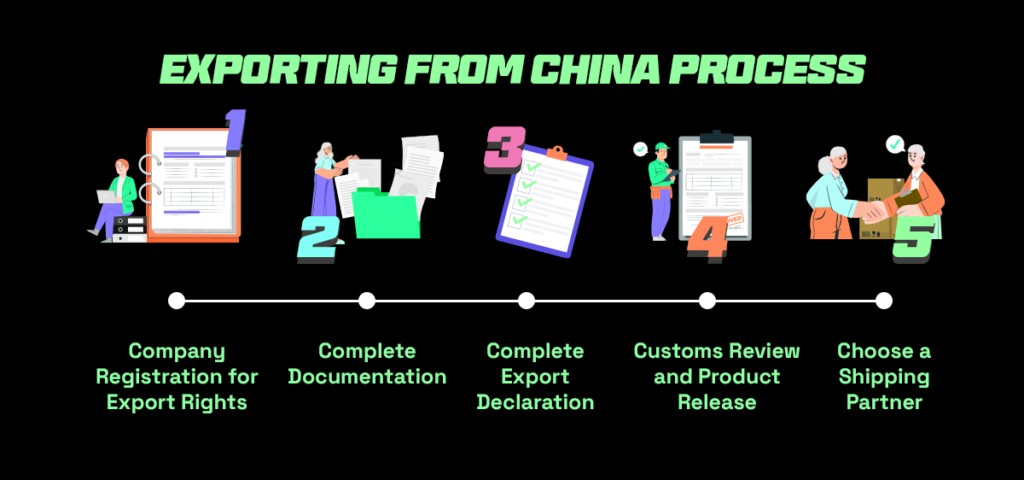
China to Singapore shipping involves several regulatory steps to ensure compliance with Chinese export laws. Businesses must adhere to these regulations to avoid delays, penalties, or the rejection of their shipments.
Step 1: Company Registration for Export Rights
To export goods from China, businesses must first register with China Customs and obtain export rights. This registration is essential for companies to legally participate in international trade. However, companies that do not have these rights can still export by partnering with foreign trade companies that hold the necessary permits.
Locad simplifies this process with its cross-border services. Since Locad operates in China, it can handle the complexities of shipping. This means companies can rely on Locad to manage the registration and logistics needed to ship goods from China to Singapore.
Step 2: Documentation Requirements
Proper documentation is a critical part of the export process. These include:
- Export Declarations: Businesses must provide detailed information about the goods, such as commodity names, HS codes, intellectual property rights, country of origin, and Customs value.
- Accompanying Documents: This includes the commercial invoice, packing list, bill of lading, contract, and reconciliation form.
- Special Certificates: Depending on the type of goods, exporters may need additional forms such as an export license, dangerous goods packaging certificate, or an export declaration form.
- Inspection and Quarantine Applications: For goods subject to inspection and quarantine, businesses must submit relevant applications and ensure compliance with inspection requirements.
Step 3: Export Declaration Process
Exporters have two main options for submitting declarations to China Customs:
- Custom Brokers: Businesses can hire custom brokers to handle the declaration process on their behalf.
- National Single Window: Alternatively, exporters can directly submit their export declaration data through the “National Single Window” platform.
Declarations must be submitted within 48 hours after the goods reach the Customs supervision area. It is also necessary to pay any applicable fees and taxes promptly and ensure all documentation is accurate and complete.
Step 4: Customs Review and Product Release
China Customs uses an automated system to review export declarations. If the goods are deemed low-risk, they can be quickly processed and cleared. However, if there are doubts about the shipment, Customs may require a manual review. In cases where discrepancies are found, Customs can request re-declarations or reject the shipment.
Once the review is successfully completed and all requirements are met, China Customs will release the goods for export. It is crucial for businesses to ensure all necessary documents are submitted to avoid delays in the release process.
Step 5: Choose a shipping partner
The shipping partner you choose plays a crucial role when shipping from China to Singapore. The right partner ensures smooth logistics, compliance with regulations, and timely delivery. Here are key factors to consider when selecting your shipping partner:
Cross-Border Experience
Choose a shipping provider with a strong track record in cross-border commerce between China and Singapore. Look for a partner experienced in handling Importer of Record (IOR) and Seller of Record (SOR) services to ensure full compliance with customs regulations. A partner well-versed in the specific logistics challenges of e-commerce can offer greater efficiency and faster handling.
Freight Options Tailored to Business Needs
Choosing the right freight option is crucial for balancing cost and delivery speed. Air freight is ideal for businesses dealing with high-value or urgent shipments, offering delivery within 1-3 days. On the other hand, sea freight is a more economical choice for bulk shipments or goods that are less time-sensitive, typically taking 5-7 days. This option includes Full Container Load (FCL) for large shipments or Less than Container Load (LCL) for sharing space in a container.
The shipping time from China to Singapore varies depending on the chosen shipping method. Below is an estimated breakdown of the delivery times for each option:
- Air freight: 3 to 5 days
- Express courier: 5 to 7 days
- Sea freight: 10 to 12 days
Locad’s freight forwarding services cover both air and sea options. In addition, Locad partners with 50+ last mile carrier partners in both countries. This ensures a seamless shipping experience, allowing you to focus on growing your business.
Singapore’s import process when shipping from China to Singapore
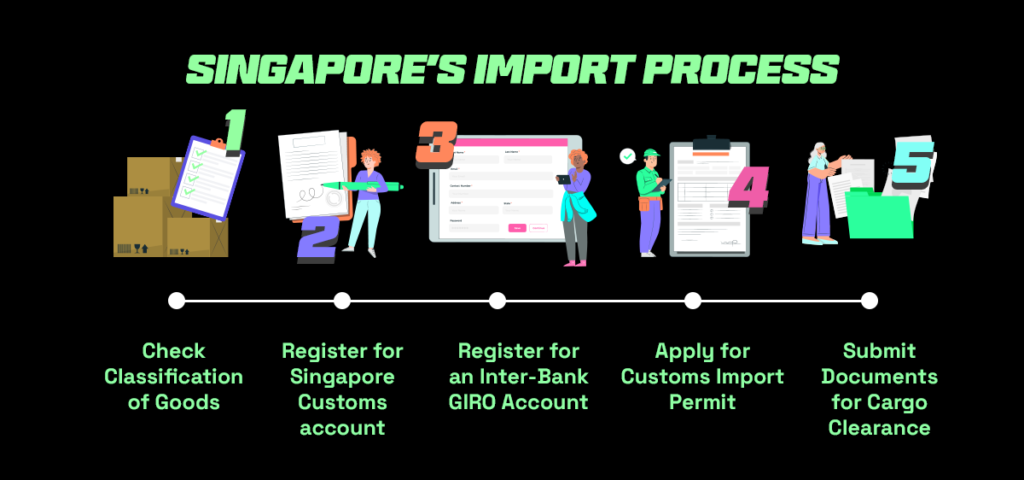
Singapore import is a multi-step process that requires careful attention to detail. As one of the world’s busiest trade hubs, Singapore has established a clear and structured import process to ensure that goods entering the country meet safety standards. Here’s a comprehensive guide to help you navigate the import process when shipping from China to Singapore.
Step 1: Double-Check Your Goods’ Classifications
Before importing, it’s crucial to verify that your products comply with Singapore’s classifications and safety regulations. Begin by ensuring your goods are not on the prohibited items list. For safety requirements, refer to the Consumer Goods Safety Regulations managed by Enterprise Singapore or other relevant regulatory bodies based on your product type.
You can use the HS/CA Product Code Search to check if your goods are controlled or restricted. Input your product description, HS code, or the Competent Authority (CA) product code to find relevant information.
Step 2: Register for a Singapore Customs Account
To import goods, you need a Unique Entity Number (UEN), which is essential for all transactions with Singapore authorities. Register with the Accounting and Corporate Regulatory Authority (ACRA) to obtain your UEN. If this isn’t possible, contact a relevant UEN Issuance Agency such as Enterprise Singapore. Once you have your UEN, activate your Singapore Customs Account through their website.
Step 3: Register for an Inter-Bank GIRO Account
An Inter-Bank GIRO (IBG) account is necessary for paying Goods and Services Tax (GST), import fees, and other customs-related charges. Complete the IBG application form and mail it to Singapore Customs. Approval typically takes 3-4 weeks. Once approved, you can authorize your Declaring Agent to use the IBG account for payments.
Step 4: Arrange for Security
For certain transactions, such as those involving dutiable goods or temporary imports, you need to lodge security with Singapore Customs. This can be done via an Insurance Bond, Banker’s Guarantee, or Finance Company Guarantee. Submit the completed security form to the Singapore Customs Registration Unit, and they will register it within three working days.
Step 5. Apply for Your Customs Import Permit
With your Customs Account activated, you can apply for an import permit through TradeNet, Singapore’s online trade platform. Register as a Declaring Agent or appoint one to handle the process for you. Permit applications cost S$2.88 each, excluding any additional charges from agents or freight forwarders. For containerized cargo, include the shipper seal and container numbers in your application.
Step 6: Submit Documents for Cargo Clearance
Finally, prepare and submit the necessary documents for cargo clearance. These include the Customs Import Permit, commercial invoice, packing list, certificate of origin, air waybill or bill of lading, and other relevant certificates. Keep copies of these documents for at least five years, as they may be requested by Singapore Customs post-clearance.
Import taxes and duties when shipping from China to Singapore
When shipping from China to Singapore, it’s essential to be aware of the taxes and duties imposed by Singapore Customs. The key taxes to consider are the Goods and Services Tax (GST) and excise duties, which vary depending on the type of goods you’re importing.
Goods and Services Tax (GST)
GST applies to non-dutiable goods. These goods do not incur customs duties but are still subject to GST upon import into Singapore. Common non-dutiable items include clothing, electronics, and household goods.
For dutiable goods, both GST and customs duty need to be paid if the goods are imported for local consumption. Dutiable goods include items such as alcohol, tobacco, petroleum products, and motor vehicles.
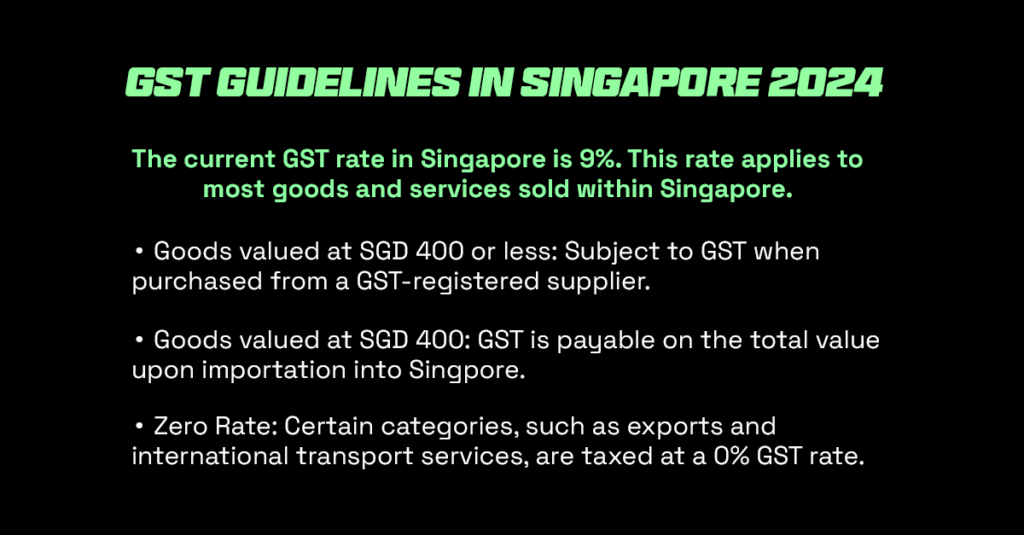
Excise Duty:
Excise duty applies to specific goods, such as alcohol, tobacco, petroleum products, and motor vehicles. The rate of excise duty varies by product. For instance:
- Alcoholic beverages: 8% GST + 20% excise duty
- Cigarettes and tobacco: 8% GST + 40% excise duty
- Motor vehicles: 8% GST + 15% excise duty
- Petroleum products: 8% GST + 10% excise duty
Certain goods, such as food or medical supplies, might be exempt from GST. You can refer to the Singapore Customs website for a complete list of exempt goods.
How much does it cost to ship from China to Singapore?
The cost of shipping from China to Singapore in 2025 can vary based on several factors. Freight forwarders typically need the following details before providing an accurate quote:
- Type of shipment
- Preferred shipping method (FCL, LCL, or air freight)
- Weight and dimensions of the goods
- Shipping origin and destination
- Service type (e.g., port-to-port or door-to-door)
The price difference between air freight and LCL sea freight is relatively small for shipments under 200 kilograms. For heavier shipments, however, sea freight usually becomes more cost-effective, even though it takes longer.
Cost of Shipping 20ft and 40ft Containers
The cost to ship containers from China to Singapore depends on the container size and the route:
- 20-Foot Container: Shipping a 20-foot container typically costs between US $1,050 and US $2,050.
- 40-Foot Container: The cost for a 40-foot container ranges from US $1,550 to US $3,050.
The exact price can vary based on the shipping route and other factors, so it’s best to consult with your freight forwarder for a detailed quote.
Sea Shipping
Sea shipping charges, especially for Less than Container Load (LCL), are calculated based on the space your shipment occupies in the container. The billable weight is determined by comparing the dimensional weight to the actual weight.
For example:
Volumetric Weight Calculation: Length x Width x Height (in cubic meters)
Actual Weight to CBM Conversion: Divide the actual weight by 1,000 to get CBM.
Estimates:
- Shanghai to Singapore
- 20 FT container – $1250
- 40 FT container – $2050
- Shenzhen to Singapore
- 20 FT container – $1150
- 40 FT container – $1850
Air Freight
Air freight costs depend on factors like the type and weight of cargo, airline, route, and season. Heavier shipments generally have lower per-kilogram rates. Typically, shipping 100 kilograms can cost between USD 4 and USD 8 per kilogram.
Shipping via sea and air freight can be costly depending on the size and weight of your shipment.
Locad offers both sea and air freight services, along with comprehensive freight forwarding solutions, ensuring efficient and cost-effective shipping.
International Express Shipping
Express shipping costs from China to Singapore vary by service provider and are influenced by factors like the type of goods, weight, and packaging size. Here’s a breakdown of estimated costs from popular couriers:
- DHL Express: Shipping typically ranges from USD 5 to USD 7.5 per kilogram.
- UPS: Costs are generally around USD 10 per kilogram.
- FedEx: Rates usually fall between USD 9 and USD 11 per kilogram.
International express shipping from China to Singapore can be complex and expensive.
With Locad, brands can offer express international shipping on Shopify, ensuring faster deliveries and seamless fulfillment.
Ship from China to Singapore with Locad
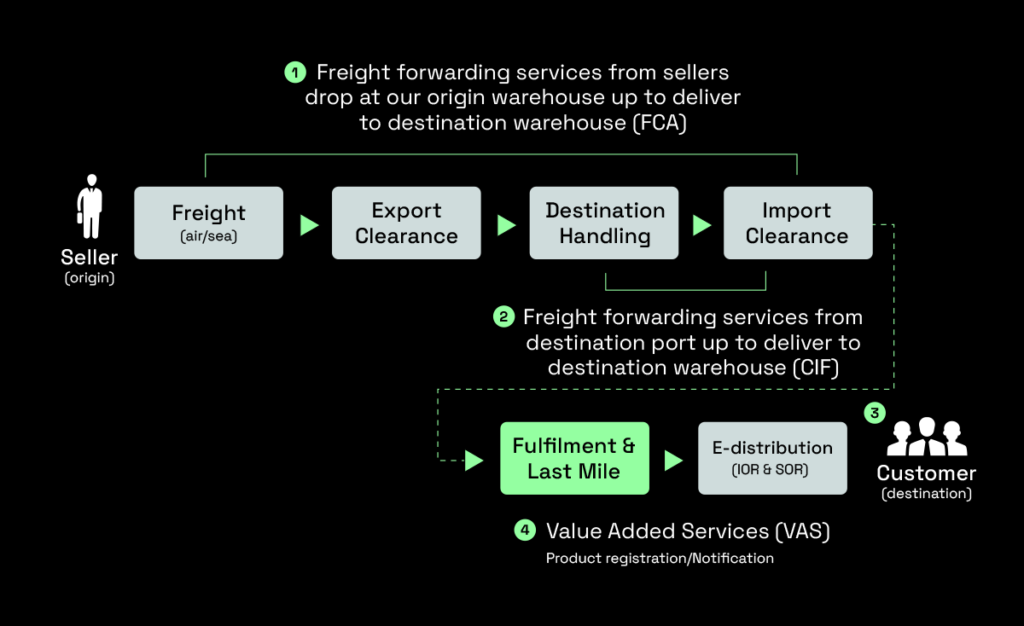
Locad provides an easy, reliable way to ship from China to Singapore. With an extensive network in both countries, we manage the entire logistics process to ensure your goods are delivered on time.
Freight Forwarding from Supplier’s Warehouse: Locad handles the movement of goods starting from your supplier’s warehouse in China. Whether you choose air or sea freight, we ensure your products are picked up and transported efficiently.
Export and Import Clearances: Locad takes care of both export clearance in China and import clearance when your goods arrive in Singapore. Through Importer of Record (IOR) services, handle the necessary paperwork and ensure your shipment complies with customs regulations.
Destination Handling and Warehouse Delivery: Once your goods clear customs, Locad handles the delivery from the port to one of our destination warehouses in Singapore. Our warehouses, located in key areas, allow for distributed inventory storage.
Fulfillment and Last-Mile Delivery: Locad’s warehouse network ensures your products are stored close to your customers, reducing delivery times and costs. Once products arrive at our Singapore warehouse, they are prepared for delivery to customers. We also make sure your products are picked and packed on the same day.
Value-Added Services (VAS): Locad also offers services like product registration and notifications to support your business once your goods are ready to be sold. In addition, our Seller of Record (SOR) services help with compliance and distribution, ensuring everything is in order for a smooth e-commerce experience.
Conclusion
Shipping from China to Singapore is an essential part of the global supply chain. With China being a major manufacturing hub, companies benefit from cost-effective sourcing and a wide variety of products. Singapore’s well-established logistics infrastructure further enhances the efficiency of the shipping process. Ultimately, this shipping route is essential for businesses seeking to optimize their supply chains and maintain a competitive edge in the market.






